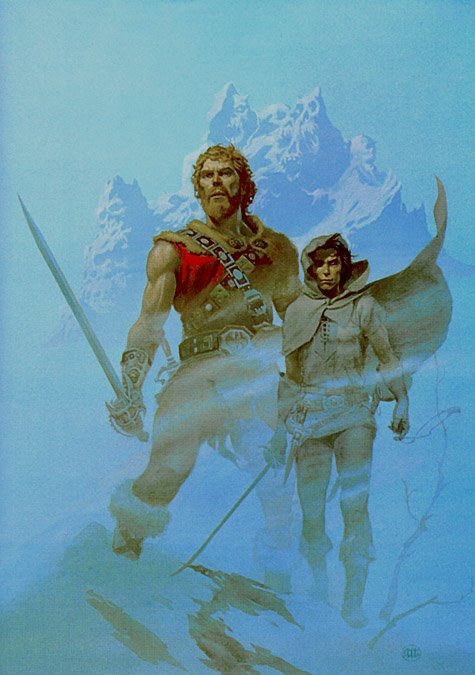Fafhrd and the Gray Mouser, by Fritz Leiber
First of all, I think it's worth pointing out that I mentioned a specific type of fantasy above: epic fantasy as distinct from sword and sorcery, steampunk and urban fantasy. Sword and sorcery, at least as typified by, for example, Fritz Leiber's Lankhmar stories, is very well-suited to the shorter form, and given how much overlap there is between it and epic fantasy, might present a key argument against my thesis above. In fact, you could even argue that sword and sorcery is epic fantasy specifically adapted for short stories.
But I feel that analogy starts to break down, because of the absolute preponderance of gigantic fantasy novels on bookshelves these days, and the near-total lack of work in that genre in the short form (apart from George RR Martin and Gardner Dozois's recent anthologies). But even urban fantasy seems to be best delivered in the form of series of full novels, though notably shorter than those in epic fantasy. As for steampunk, a genre I haven't read much of, it seems to me that it straddles the line between SF and plain old F - and even there you don't see huge amounts of short story length work.
Economics probably sheds more of a light on this. My understanding is that writing novels pays better than writing short stories - at the very least, GRRM's brick-sized tomes are easier to stock than, say, Daniel Abraham's "The Cambist and Lord Iron", which means they're easier to sell. And yet...
Looking through the listings of speculative fiction magazines, it's clear that science fiction still dominates that scene. And even though he's not a household name like George RR Martin is (at least, in my household), Ted Chiang has still made a name for himself writing almost exclusively in the short story or novelette forms. So there's more to this than the fact that the trend in bookstores now is for ever-bigger novels - and let's be honest, there are few science fiction authors out there, apart from Peter F Hamilton, coming out with series of doorstopper novels.
Maybe you could argue that there's less to explain with more futuristic stories, although I don't think that's necessarily true. Another argument is that science fiction effectively spread into the mass market through short stories published in pulp magazines, although that ignores the work of Robert E Howard or HP Lovecraft, which also came from the pulps.
In any case, this whole line of thinking of mine comes from the whole question of what the best way is to break into the industry. While I subscribe to Steve Martin's advice - "be so good they can't ignore you" - I also wonder sometimes whether I should be focusing on writing and refining my short stories, or on my novels. There are examples of writers who have done both, and in both genres - that Daniel Abraham story I referenced above clearly leans more toward fantasy than science fiction. But it's an interesting question, I thought, and hope I can get someone else's thoughts on it.

No comments:
Post a Comment